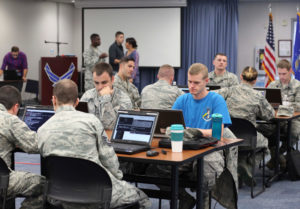In Part I, we examined leadership lessons we could learn from military historian Douglas Southall Freeman.
Freeman counseled prospective leaders to: 1) know your stuff; 2) be a man; and 3) look after your people. In this installment, we ask the question, “What Leadership Lessons Can I Learn from History?”
Some of you are skeptical. I get it. Americans, in general, may be the most historically ungrounded people the world has ever known. We’re a progressive, forward-looking people that, at times, has a contempt for the past. Much of our cultural identity is formed around a narrative of overcoming historical sins. We believe, with Francis Fukuyama, that we are the Last Man — the endpoint of mankind’s socio-cultural evolution into the perfect, final form of humankind. What leadership lessons could we possibly learn from dead men and women? Spoiler alert: ‘nearly all of them.’
Some classifications break learning down into three types: classical conditioning, operant conditioning, and observational learning. Classical conditioning refers to the association made between a previously neutral stimulus and a stimulus that naturally evokes a response, as made famous by Pavlov’s classic experiment. Operant conditioning refers to the learning process in which the probability of response occurring is increased or decreased due to reinforcement or punishment. Skinner studied this extensively. In terms of learning leadership, both methods play their respective roles. Over the course of a lifetime, all of us have learned important leadership lessons by the conditioning we’ve received. However, the final form — observational learning — offers much more in the way of learning leadership skills.
One of the things I’ve taught my children from the earliest age is that we all learn from experience. The fool learns only from his or her own experience, if at all. The wise man or woman learns from the experience of others. In all areas of life, we have the opportunity to learn leadership observationally. It starts with the first leaders to whom you were exposed: your parents. How effective were they in leading you to become the type of person they wanted you to be? What methods and techniques did they use to teach? Were they micromanagers, “hands-off” leaders, or something in between? Did they drill things in to you or teach you to figure things out on your own? To what experiences did they deliberately expose you? From what experiences did they fail to protect you? To what extent have you reflected on parenting as leadership?
Then, you had teachers, who also acted as leaders. Some of them you liked at the time. Some of them you hated. Others you feared but respected. On some of them your perspective has likely changed in hindsight. Perhaps they decided it was more important to be respected than loved and they led accordingly. As a student, you may not have appreciated how important this was to your development.
Finally, you’ve had leaders in other areas of your life — sports teams, church, the work force, non-profit volunteers, etc. From all of these people, you’ve been observing and <hopefully> learning leadership lessons. Did they know their stuff? Did they “play the man” (or woman) when times got tough and earn your respect? Did they take care of their people in a way that led to organizational success? How? Why or why not? If you’re alive and breathing and reading these words, you’ve had countless opportunities to learn leadership observationally. Hopefully, you’ve been wise and learned from both the good and bad experiences of others.
No one, though, has had a life so full and rich that they’ve been exposed to all the leadership challenges life has to offer. I’m 47 years old, a retired Navy officer, a father of five, and a business owner. I’ve lived through a submerged collision with a Russian submarine, the then-largest maritime drug bust in US history, quarantine during riots in a foreign country, a burning Pentagon on 9/11, “shock and awe” during the war in Iraq, President Bush’s Mission Accomplished speech on the USS ABRAHAM LINCOLN, the 2004 Indonesian tsunami, transitioning to civilian life, and founding/running a business through good times and bad. I’ve had no shortage of opportunity to display good — or poor — leadership. None of this experience, though, prevents me being faced with new and unfamiliar leadership challenges on a weekly basis. I have learned in various degrees what works from my own past, but I prefer to broaden that experience by learning from others. And there is no richer leadership well of experience from which to drink than that found in the history books. Why? Because if the erstwhile historical event wasn’t a fantastical leadership challenge, it likely wasn’t recorded. Or, if it was, it’s liable to be a book not much worth reading.

Fortunately, the world is full of history books worth reading. And if you’re an aspiring leader, you should get to it. Don’t be daunted by the almost infinite sea of material from which to choose. Don’t get caught up in whether to start with the present and move backwards, start from the past and move forward, or start in the middle, and move out. It doesn’t matter. We’re not encouraging you to become an expert historian — only a better leader. And remember, it doesn’t have to be in the distant, immemorial past to be history. Everything that happened yesterday is history. Pick up 13 Hours: The Inside Account of What Really Happened in Benghazi and read a fascinating tale of both extremely poor and absolutely outstanding leadership. Get 1776 by David McCullough and read about the leadership that set our country on its current trajectory. Listen to Steve Jobs during your commute and learn about one of the modern world’s most successful businessmen. Biography is focused history. And, one of the best ways to learn leadership skills. Ask yourself, “what key leadership decision(s) led to the success or failure of this individual/situation/organization?” Ponder what could have been done differently and what would have been the likely change in outcome. Place yourself in that situation and decide whether you would have had both the courage and wisdom to make the same decision and if not, what you should be doing to develop those traits.
Don’t have the patience for a good history book? See it in the movies. Watch We Were Soldiers and ponder the significance of Hal Moore’s foot. Why was the scene leaving the ground in Vietnam a leadership lesson worth a close-up of his boot? Watch Lawrence of Arabia and observe Peter O’Toole play one of the twentieth century’s most interesting leaders in one of its most fascinating historical environments. Observe the middle eastern culture portrayed in that movie and how T.E. Lawrence and his fellow British officers exercised both effective and ineffective leadership in attempting to deal with it. Rent The Blind Side, pop some popcorn with the kids, and watch how Sandra Bullock shows more effective football leadership than the coaches on her adopted son’s team.
Any time I get a chance to talk on leadership, I encourage every aspiring leader to pick a character from history possessing a leadership style with which they can empathize — just the style of leadership. Some leaders lead by instituting firm discipline in their particular organization. Some by being cheerleaders. Others by setting a quiet example. Still others by casting a vision with which their followers can identify. Read about that leader. Watch the movie. Meditate on their personality traits. Be inspired by your positive similarities and learn to emphasize them in your own style. Observe their weaknesses in your own life and learn to mitigate those tendencies through insight and self-reflection. After all, leadership is not about merely doing the right thing; it is about inspiring others to follow you. In order to do that, you must be someone worth following.
These are only a few thoughts from a host of leadership lessons from history just waiting to be learned. Don’t be intimidated. And don’t wait. Those who refuse to learn from the leadership mistakes of history, after all, are doomed to repeat them.
Stick with us for Part III, in which we will examine a twist on learning observationally from those who existed in the past — i.e., learning from those who never existed.


